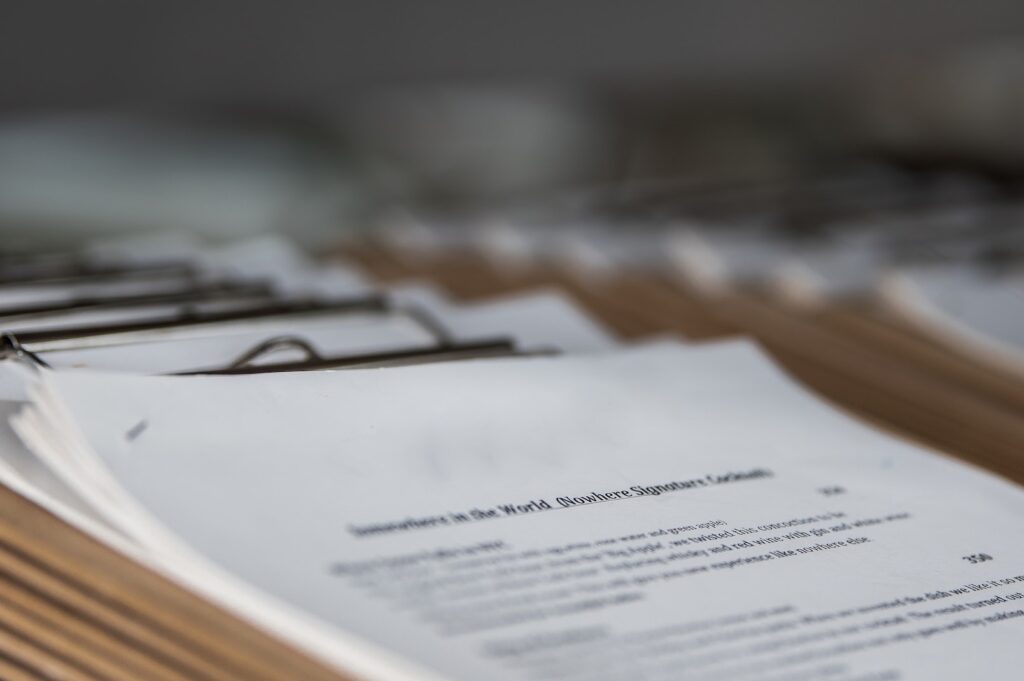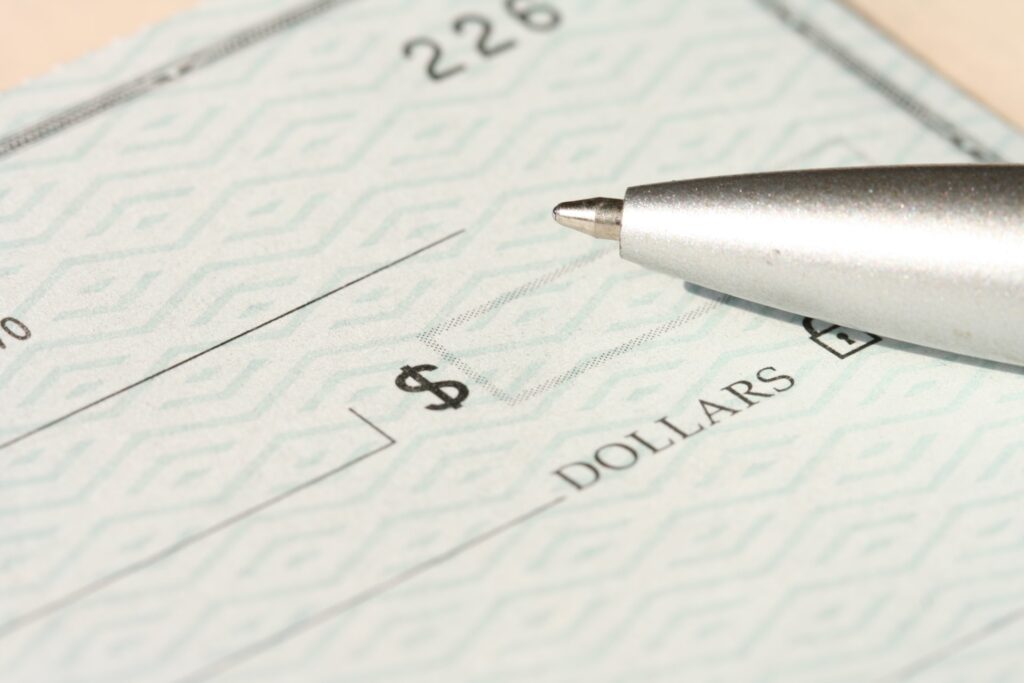The public deed represents the final step in the property purchase process, where the buyer makes the payment, and the seller hands over the keys. In this guide we tell you everything you need to know about the deed process.
What is the Deed of Purchase and Sale?
In Portugal, a “deed of purchase anda sale” refers to a legally binding document that finalizes the sale of a property. This document is known as an “Escritura Pública de Compra e Venda” is a public document and it is typically signs before a notary or a lawyer who is authorize to perform such transactions. Typically, it occurs on the date specific in the promissory contract.
Here are the key aspects of a deed of purchase in Portugal:
- Location;
- Parties Involved;
- Documentation;
- Reading of the Deed;
- Payment;
- Signatures;
- Registration.

1. Location
The certification notary public typically oversees this formal and legally binding event in a notary’s office, where it occurs.
In Portugal, legal professionals, known as notaries, specialize in real estate transactions. They ensure the legality, accuracy, and fairness of the process. Notaries, impartial third parties, protect the interests of both the buyer and the seller. They conduct due diligence on the property’s legal and fiscal status, review all documentation, and verify that the terms of the transaction comply with Portuguese law.
While the notary’s office is the most common venue for signing the deed, it’s not the only option. The buyer and seller can agree to hold the signing at the seller’s lawyer’s office or another mutually convenient location. This flexibility accommodates special circumstances or preferences and requires agreement from all parties involved.
In some cases, a seller may choose to have their legal counsel present during the signing to ensure their interests are adequately represented. Such arrangements are typically made well in advance of the signing to avoid last-minute complications.

2. Parties Involved
In a real estate transaction in Portugal, several key parties meticulously orchestrate the signing of the deed of purchase, each with specific roles and responsibilities.
The Buyer: The buyer is the individual or entity acquiring the property. This party is a central figure in the transaction, as they are making a significant financial commitment.
The Seller: On the other hand, the seller, whether an entity or an individual, relinquishes ownership of the property. They must prepare to provide a clear title to the property and fulfill any obligations specified in the sale agreement.
The Notary or Lawyer: The notary or lawyer, often referred to as the ‘notário’ or ‘advogado,’ plays a critical role in the process. They are impartial and responsible for overseeing the deed signing.
Power of Attorney: In some cases, if the buyer or seller cannot attend the deed signing in person, they can opt to grant power of attorney to a legal representative who can act on their behalf. It’s important to note that granting power of attorney involves specific legal documentation.

3. Documentation
In any real estate transaction, the completeness and accuracy of documentation are paramount. Ensuring that all necessary documents are in order is a foundational step in the property purchase process. Here’s an extensive perspective on the significance of these documents:
Selling Real Estate: Documents
Identification Card: Seller should be prepared to present valid identification. This can include a passport, a ID card or other.
NIF Number: “Número de Identificação Fiscal”, or fiscal identification number, is a fundamental requirement for any financial transaction in Portugal.
Property Registration Certificate: often referred to as the “Certidão Permanente,” is a vital document in the property buying process in Portugal.
Legal Description of the Property (“Caderneta Predial”): It serves as a detailed legal description of a property in Portugal, including essential information such as the property’s fiscal identification number (NIF), location, area, use classification, and any existing mortgages or charges.
Real Estate Property Documents
Permission to Use (“License of Use”): also known as the “Licença de Utilização,” is a document that certifies that a property complies with all necessary legal and safety requirements for occupancy.
Housing Technical Sheet: or “Ficha Técnica de Habitação,” is a document that provides detailed technical information about a property. It includes data such as the property’s construction features, materials used, and energy efficiency specifications.
Energy Performance Certificate: (Certificado Energético) is a document that evaluates a property’s energy efficiency and environmental impact. It assigns an energy efficiency rating to the property, ranging from A+ (most efficient) to F (least efficient).
Buying Real Estate: Documents
Identification Card: Buyers should prepares to present valid identification. This can include a passport, a European ID card, or a Cartão de Residência (residence card), depending on the individual’s immigration status.
NIF Number: The NIF, or fiscal identification number, is a fundamental requirement for any financial transaction in Portugal, including property purchases.
Banker’s Draft for Remaining Purchase Price: The remaining balance of the property purchase price should be provided in the form of a banker’s draft.
Receipt for Transfer Tax (IMT) and Stamp Duty (IS) Payment: The buyer should provide the remaining balance of the property purchase price in the form of a banker’s draft.
Payment for Notary Fees: Traditionally, these fees were paid by cheque, but it’s increasingly common to make payments via ‘multibanco’ (ATM) or card.

4. Reading the Deed of Purchase and Sale
The notary or lawyer plays a multifacation role in the deed signing process, with one of their pivotal responsibilities being to facilitate a clear and thorough understanding of the deed’s content and implications for both the buyer and the seller.
Reading the Deed Aloud: The act of reading the entire deed aloud serves a crucial purpose. It ensures that all parties involves have a comprehensive understanding of the document’s terms and conditions. The notary or lawyer is usually fluent in Portuguese, which is the language of legal transactions in Portugal.
Language Assistance: Understanding a legal document written in a language one is not proficient in can be challenging. To address this, there are a few options available to non-Portuguese-speaking individuals. First, the buyer can engage a lawyer or a buyer’s agent who is proficient in both Portuguese and the buyer’s native language. Alternatively, the buyer can hire a separate professional translator to assist during the signing.
Acknowledgment and Agreement: Importantly, both the buyer and the seller must actively acknowledge and agree to the terms and conditions of the deed. This acknowledgment is not merely a formality; it signifies the inform consent of all parties involve.

5. Signatures
The moment of signature during the deed signing process is both symbolic and legally significant. It represents the final act that formally binds the buyer and the seller to the terms of the transaction. Here’s an extend perspective on this crucial step:
Legal Formality: When all parties involve in the transaction, namely the buyer, the seller, and the notary or lawyer, reach a mutual understanding and agreement regarding the deed’s content, they proceed with the signing.
Notary or Lawyer’s Role: The presence of the notary or lawyer during the signing is paramount. Their role is to ensure that the signing process is carries out correctly and that all necessary legal formalities are observes.
Distribution of Copies: Following the signing, copies of the execute deed are provided to both the buyer and the seller. These copies are more than just records; they serve as essential proof of the transaction and ownership transfer.
Notary’s Official Record: The original deed, which bears the signatures of all parties, is retain by the notary or lawyer. This official record is securely store and register with the Land Registry and the Tax Authority to confirm the change in property ownership.

6. Payment
The signing of the deed in a property transaction represents a momentous occasion where the buyer is require to fulfill their financial commitment by paying the remaining purchase price for the property.
Paying the Remaining Purchase Price: The remaining purchase price signifies the outstanding balance owed by the buyer to the seller, in accordance with the terms and conditions outlined in the purchase agreement. This amount encompasses the agreed-upon purchase price minus any initial deposits or prepayments made throughout the transaction.
Exchange of Keys: Simultaneously with the payment of the remaining purchase price, the exchange of keys takes place. This represents the transfer of physical possession and access to the property from the seller to the buyer. It is a symbolic moment signifying the buyer’s acquisition of the property.

7. Registration of the Deed of Purchase and Sale
The registration of the deed is a pivotal step in the property purchase process, as it holds the key to officially transferring ownership from the seller to the buyer.
Responsibility of the Notary or Lawyer: Once the deed is sign, it becomes the responsibility of the notary or lawyer to ensure the deed is register.
Land Registry: The first destination for the register deed is the Land Registry. Here, the details of the property transaction are record in an official public database.
Tax Authority: Simultaneously, the register deed is submitted to the Tax Authority. This step is crucial for tax-relate matters.
Proof of Ownership Transfer: Registration is the definitive evidence of the property’s ownership transfer from the seller to the buyer.
For more videos about investing or moving to Portugal, explore our YouTube channel here: YouTube Channel Portugal Residency Advisors®.
Frequently Asked Questions About the Deed of Purchase and Sale in Portugal
What is a deed of purchase and sale in Portugal?
A deed of purchase, also known as a “Escritura,” is a legally binding document that formalizes the transfer of ownership from the seller to the buyer in a property transaction in Portugal.
Where does the signing of the deed typically take place?
The signing of the deed usually takes place in a notary’s office, but it can also happen at the office of the seller’s lawyer or another location agreed upon by both parties.
Who are the main parties involved in the deed of purchase?
The main parties involved are the buyer and the seller of the property. Both parties, along with the notary or lawyer, are usually present during the signing. If the parties cannot attend in person, they can grant power of attorney to their legal representatives.
What happens during the signing of the deed of purchase and sale?
The notary or lawyer reads the entire deed aloud to the parties involves to ensure they understand its content and implications. Both the buyer and the seller must acknowledge and agree to the terms of the deed.
What financial aspects are involved at the signing of the deed?
At the signing of the deed, the buyer is expect to pay the remaining purchase price for the property, as well as associated notary fees, property transfer taxes, and stamp duty. Payment is often makes through certify checks or bank transfers.
What documents does the buyer need to deliver at the signing of the deed?
The documents need from the buyers for signing a deed of purchase are:
- NIF Number (Número de Identificação Fiscal);
- Personal Identification (ID Card, Passport);
- Banker’s Draft for Remaining Purchase Price;
- Receipt for Transfer Tax (IMT) and Stamp Duty (IS) Payment;
- Payment for Notary Fees.
Do I need legal representation when signing a deed in Portugal?
While legal representation is not mandatory, it is highly advisable to have a notary or lawyer oversee the process to ensure legal compliance and protect your interests.




